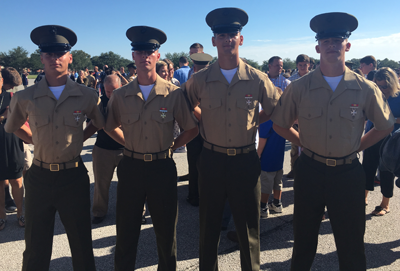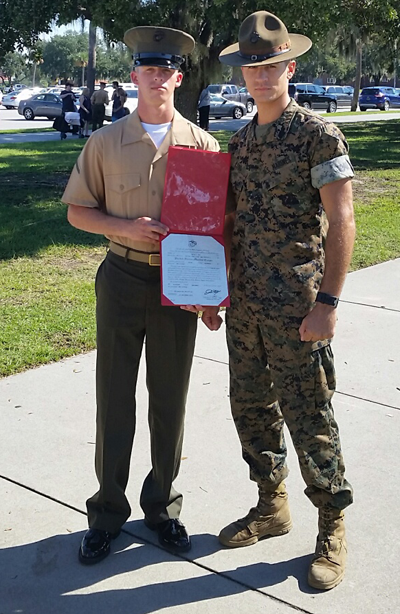Revere graduate returns home from Marine Corps boot camp after several months
Photos courtesy of the Nye family, used with permission.
Nye poses with his drill instructor Sergeant Long after graduation.
A screeching bus comes to a stop; seconds later 20 men and women are yelled out of their seats and onto a multitude of yellow footprints. Each person’s mind racing as they realize this is really happening; each one thinking “This is it, I am going to be a United States Marine,” Only the strong willed and strong minded make it through the harsh training of Marine Corps boot camp, Revere graduate Jake Nye is one of those proud few.
Nye is a field radio operator for the United States Marine Corps (USMC) and has just completed Marine Corps boot camp. The U.S.M.C. is a branch of the United States Armed Forces responsible for providing power projection, using the mobility of the United States Navy to deliver rapidly combined-arms task forces on land, at sea, and in the air. Nye describes his career choice.
“The marines just kind of stood out to me personally and the way they treated me, the way they talked to me, they weren’t forcing me to join they were telling me all the benefits of joining,” Nye said.
Nye described boot camp as a very challenging and tough experience that was completely necessary in molding him into the Marine that he is today.
“You would wake up at four o’clock in the morning and you did not stop moving until eight o’clock at night,” Nye said..
In Marine corp boot camp each person is assigned to a platoon, and in that platoon everybody does everything together. Nye reflected on his experiences with his platoon.
“You were doing everything [together], I mean you would eat as a platoon, shave as a platoon, you would brush your teeth as a platoon, and you would get punished as a platoon. If one person messes up, the platoon messes up, that’s how it happened and so we would always be pushed to do our best and give one-hundred percent,” Nye said.
Each platoon has a drill instructor. Drill instructors have the duty of indoctrinating new recruits entering the military. Nye described his time with his drill instructor.
“Everything they do [the drill instructors] to the stupidest little thing it serves a purpose for your training,” Nye said.
Marine Corp boot camp is the right of passage for a civilian to become a United States Marine. While in boot camp to-be Marines are faced with strenuous mental and physical obstacles that few can overcome. Many recruits drop out of boot camp before the end, only the strong willed make it through, and Jake Nye is among those few. He mentioned the hardships of boot camp.
“It was very challenging, there were many times where I wanted to quit but all I did was think about my family and my friends and thought about everybody back home and that’s what got me through,” Nye said.
While in boot camp recruits are subject to a very restricted communication policy, forbidding the use of cell phones. Recruits were able to communicate through letters, and rare phone calls homes. Phone calls only occurred in boot camp when a recruit did something that warranted it, for Nye that was scoring a perfect three-hundred out of three-hundred on his Combat Fitness Test and a two-hundred eighty-seven out of three-hundred on his Physical Fitness Test.
In boot camp recruits do not just go through a series of demanding physical tests and mental tests but also suffer through the pain of being away from loved ones for an extended period of time. Thirteen weeks is the average time for Marine Corp boot camp. Nye expresses what it was like being away from his family for so long.
“At first it was really hard because every time I would think about them I’d start to tear up a little bit but as it went on it was like, once I thought about them I [thought to myself] I’m doing this for them,” Nye said.
As recruits are away for such an extensive period of time they get constantly told what to do by their drill instructors. When recruits come back from boot camp they have to adjust to being back to normal again. Nye recounts what it was like coming home after boot camp.
“At first it was really weird getting to actually walk around and do your own thing because for three months I was told do this, do it this way, and do it in this amount of time, and that’s how it was for everything,” Nye said.
The final stage of a recruits right of passage is the Crucible. The Crucible is a fifty-four hour period where recruits get only eight hours of sleep. As the final stage to become a U.S. Marine, recruits get put through backbreaking physical and mental obstacles that challenges them to put in one-hundred percent effort and to never give in. During the Crucible recruits are constantly on their feet and moving, it is a time where recruits really see if they can handle being a United States Marine. Nye conveys the impact it had on him as a Marine and a person.
“The Crucible was probably the hardest thing I have ever had to go through, and it really just taught me to keep moving, keep pushing, and work and when you work hard enough you’ll get through it,” Nye said.
In Marine corps boot camp, drill instructors try to push every recruit to their limits to create a United States Marine. Nye describes the impact the Marines have had on him.
“The corps has had a very positive impact on me, and it’s taught me a lot about respect and loyalty of course the corps values that they have, honor, courage, and commitment. That’s been basically branded into my heart so I have to hold myself to a higher standard now and that’s really what helps me,” Nye said.
According to Jake, boot camp is a challenge for the recruit but also a challenge for the recruits family as well. Jake’s father, Jaymes Nye, described what it was like waiting to hear from him and for him to come home.
“Waiting for letters from him was like a kid waiting to open Christmas presents . . . also not really know what he was going through, if he was having a tough time or was hurt or sick . . . those things are constantly wandering through your mind,” he said.
As a United States Marine, there is always the possibility of being deployed into dangerous situations overseas. As a father of a United States Marine Jaymes Nye expresses what it is like knowing the possible dangers his child could be faced with.
“As a father, obviously there is a tense feeling of seeing your son go into a dangerous situation . . . None of us know what the future holds or how long we will be a part of that future, and we pray Jake always considers what God wants him to do and he always strives to be a good example to others around him,” he said.
Jake’s younger brother Max Nye, a junior at Revere high school, also described how he feels about Jake’s deployment into danger.
“It scares me, a lot, I don’t want to lose my brother, he’s really important to me, I don’t know what I’d do without him,” Max said.
Nye embraces his mother at graduation.


From the moment a recruit steps off the bus and stands on the yellow footprints, marking the beginning of their journey, to the moment they earn the Eagle Globe and Anchor pinned onto their uniform, a Marine must live an honorable life and be governed by the corps values of honor, courage, and commitment. Those are the three words they live by, the words that make a United States Marine.












